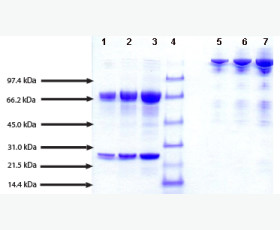Recombinant Human/Mouse Fibroblast Growth Factor 8B/FGF-8B
| Product name: | Recombinant Human/Mouse Fibroblast Growth Factor 8B/FGF-8B |
| Source: | E.coli |
| Purity: | Greater than 95% as determined by reducing SDS-PAGE. |
| Buffer Formulation: | Lyophilized from a 0.2 μm filtered solution of PBS, pH7.4. |
| Applications: | SDS-PAGE, Western Blot (WB), ELISA (EIA), Immunoprecipitation (IP) |
| Storage: | Avoid repeated freeze/thaw cycles. Store at 2-8 degree C for one month. Aliquot and store at -80 degree C for 12 months. |
| UOM: | 100ug/50ug/200ug/1mg/1g |
| Source | E.coli |
| Description | Recombinant Human/Mouse Fibroblast growth factor 8B is produced by our E.coli expression system and the target gene encoding Gln23-Arg215 is expressed. |
| Names | Fibroblast growth factor 8,Androgen-induced growth factor,Heparin-binding growth factor 8,AIGF,HBGF-8,FGF-8B |
| Accession # | P55075-3 |
| Formulation | Lyophilized from a 0.2 μm filtered solution of PBS, pH7.4. |
| Shipping |
The product is shipped at ambient temperature. |
| Reconstitution |
Always centrifuge tubes before opening. Do not mix by vortex or pipetting. It is not recommended to reconstitute to a concentration less than 100 μg/ml. Dissolve the lyophilized protein in ddH2O. Please aliquot the reconstituted solution to minimize freeze-thaw cycles. |
| Storage |
Lyophilized protein should be stored at < -20°C, though stable at room temperature for 3 weeks. Reconstituted protein solution can be stored at 4-7°C for 2-7 days. Aliquots of reconstituted samples are stable at < -20°C for 3 months. |
| Purity |
Greater than 95% as determined by reducing SDS-PAGE. |
| Endotoxin | Less than 0.1 ng/µg (1 IEU/µg) as determined by LAL test. |
| Amino Acid Sequence |
MQVTVQSSPNFTQHVREQSLVTDQLSRRLIRTYQLYSRTSGKHVQVLANKRINAMAEDGDPFAKL IVETDTFGSRVRVRGAETGLYICMNKKGKLIAKSNGKGKDCVFTEIVLENNYTALQNAKYEGWYM AFTRKGRPRKGSKTRQHQREVHFMKRLPRGHHTTEQSLRFEFLNYPPFTRSLRGSQRTWAPEPR
|
| Background | Fibroblast growth factor 8 (FGF8) is a member of the fibroblast growth factor family. It is discovered as a growth factor essential for the androgen-dependent growth of mouse mammary carcinoma cells. Mouse FGF8b shares 100% aa identity with human FGF8b. FGF8 is widely expressed during embryogenesis, and mediates epithelial-mesenchymal transitions. It plays an important role in the regulation of embryonic development, cell proliferation, cell differentiation and cell migration. It is required for normal brain, eye, ear, limb development during embryogenesis and normal development of the gonadotropin-releasing hormone (GnRH) neuronal system. |














